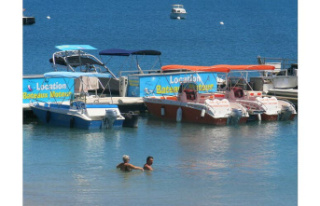In Central Saxony, the National Socialists set up one of their first concentration camps - at the same time a training center for the SS. But instead of a memorial, there is much controversy about the former commander's villa. Their outer walls may soon disappear.
Frankenberg (dpa/sn) - In the newly flared up dispute over the memorial to the Sachsenburg concentration camp, the chairwoman of the culture committee in the state parliament, Claudia Maicher (Greens), warned against hasty demolition of the former commander's villa. A complete preservation including renovation of the dilapidated building is not possible, she told the German Press Agency on Saturday. "But everything must be done to preserve as much of the building as possible and to include it in the future memorial as a place where the perpetrators died."
The background to the debate are plans by the city of Frankenberg to dismantle the building in the near future. Own funds of 30,000 euros were recently approved for this purpose. The cultural politician of the left, Franz Sodan, sounded the alarm a few days ago and asked the state government to take a stand.
There has also been heavy criticism from the five teams of architects and artists who won prizes in a competition. According to their own statements, they have again written a letter to the federal, state, district and city governments. In it they demand a halt to the preparations for the demolition and a public discussion process. They refer to the assessments of an expert, according to which it is possible in principle to preserve the outer walls of the building.
Sachsenburg is one of the early concentration camps. It was not only the forerunner of later concentration camps such as Buchenwald and Sachsenhausen, but also a training center for the SS. The concentration camp was set up in 1933 in a spinning mill. Around 10,000 people were interned before it was closed in 1937 - mainly political opponents of the Nazis such as social democrats, trade unionists and communists.
Today, a "Path of Remembrance" commemorates this history. Explanation boards are used to explain the use of individual buildings to those who are interested. For years there has also been a struggle to establish a regular memorial. According to Maicher, the federal and state governments have each promised 2.5 million euros for this. The city had announced an international competition. Last year, however, the result was met with sharp criticism from commemorative initiatives.
They were particularly bothered by the fact that the two first-place winners planned to largely demolish the badly dilapidated building. In the end, the city decided not to implement any of the winning designs and to implement the previously eliminated entry "Never Again".
In their letter, representatives of the five award-winning offices sharply criticize the fact that the competition is being ignored and that the demolition of such an important concentration camp building is being carried out "contrary to the expert's opinion". This threatens to set a precedent. The federal and state governments should not support this as donors. They are now preparing legal action, it said. At the same time, the district is asked to order an emergency backup of the outer walls in their full height.
Green cultural politician Maicher is also critical of the approach and communication regarding the competition and referred to the national importance of this memorial site. It is unbelievable that after so many years there is still no memorial there, she said. In view of the newly sparked dispute, she suggested that Minister of Culture Barbara Klepsch (CDU), who is also Chairwoman of the Board of Trustees of the Saxon Memorials Foundation, should intervene to moderate the dispute. It must be the goal for everyone to find a solution quickly.












